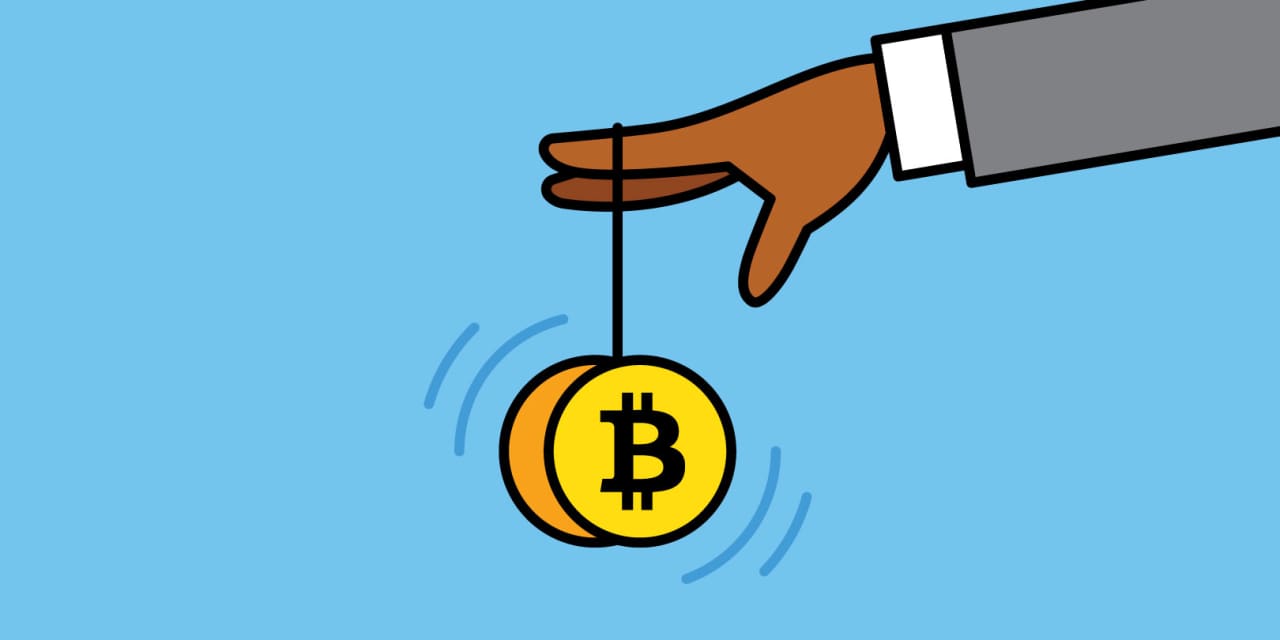The first
Bitcoin
exchange-traded funds could be approved by the Securities and Exchange Commission as soon as this coming week, and fee wars are breaking out. In filings, Fidelity and Invesco showed that the much-anticipated ETFs aren’t likely to be an immediate bonanza for firms offering them.
Fidelity disclosed that its Wise Origin Bitcoin ETF will charge just 0.39% annually in expense fees. Invesco and crypto firm Galaxy said they plan to charge 0.59% for their Invesco Galaxy Bitcoin ETF, though the fee will be waived for six months on the first $5 billion in assets.
The largest Bitcoin fund is the $26 billion
Grayscale Bitcoin Trust,
which trades like a closed-end fund and charges an annual 2% of assets fee, or $520 million at current prices. Grayscale has said it’s committed to reducing the ETF’s fee upon approval. Most other would-be contenders—nearly a dozen—have remained mum.
The ETFs will hold spot Bitcoin. The SEC for years denied spot Bitcoin applications, but an appellate court last year said its rejection of one such bid was arbitrary and capricious. Though the agency could still resist, its staff has asked potential sponsors for filing updates and other information, suggesting that approvals might be imminent.
Bitcoin ETFs should ease access to Bitcoin and drive up prices. In anticipation, prices rose above $45,000 this past week. In a note, Bernstein Research said the coin’s market cap could more than triple to $3 trillion by mid-2025.
| Company | Bitcon ETF ticker |
|---|---|
| Fidelity Investments | FBTC |
| Invesco/Galaxy Digital Holdngs | BTCO |
| Grayscale BitcoinTrust | GBTC |
| BlackRock | IBIT |
| WisdomTree | BTCW |
| VanEck | XBTF |
| Valkyrie Investments | BTF |
| Bitwise Asset Management | BITB |
| ARK Invest | ARKB |
| Hashdex | DEFI |
| 21Shares | TBD |
| Global X | BITS |
Source: Nasdaq
Write to Joe Light at [email protected]
Last Week
Markets
A new year, and Bitcoin rose to nearly $46,000 before sliding back on hopes that a Bitcoin ETF was coming. But the 2023 stock rally fell flat, with big techs like
Nvidia
and
Microsoft
selling off. Federal Reserve minutes suggested rate cuts aren’t close and December payrolls came in hotter than expected, adding 216,000 jobs. On a short week, the Dow industrials fell 0.7%; the S&P 500 lost 1.4%; and the Nasdaq Composite took a 3% hit.
Companies
Iran sent ships to the Red Sea after U.S. helicopters sank three Houthi boats attacking shipping.
A.P. Moeller-Maersk
again rerouted traffic from the area. The Dutch government blocked
ASML Holding
chip equipment going to China. BYD edged out
Tesla
as the world’s biggest electric-vehicle maker.
Walt Disney
won the backing of activists ValueAct and Blackwells Capital in a board battle with Nelson Peltz’s Trian Fund Management.
Deals
Spain’s
Iberdrola
called off its acquisition of
PNM Resources
after a New Mexico court rejected the $8.3 billion utilities deal that would have made it a major U.S. renewables energy player…China’s
Baidu
backed out of a $3.6 billion deal for
Joyy’s
livestreaming business, after regulatory delays. The deal was announced four years ago…The Wall Street Journal said Advent International was talking buyout with Fisher Investments. Fisher denied it…Bloomberg reported that
Barrick Gold
met with First Quantum investors about a takeover after Panama closed Quantum’s largest copper mine.
Write to Robert Teitelman at [email protected]
Next Week
Thursday 1/11
The Bureau of Labor Statistics releases the consumer price index for December. Consensus estimate is for the CPI to increase 3.2% year over year, one-tenth of a percentage point more than in November. The core CPI, which excludes volatile food and energy prices, is expected to rise 3.8%, compared with a 4% gain previously. The annualized change in the CPI is near its lowest level since March of 2021, which Wall Street thinks will allow the Federal Open Market Committee to start cutting the federal-funds rate as soon as March.
Friday 1/12
Fourth-quarter earnings season begins in earnest with the four largest U.S. banks by assets announcing results.
Bank of America,
Citigroup,
JPMorgan Chase,
and
Wells Fargo
all report before the opening bell. Shares of JPMorgan were the best performer of the group last year, returning 30.6%, the only one of the four to outpace the S&P 500 index’s 26.3% return. Bank of America stock trailed, partially on concerns over unrealized losses on its large bond portfolio.
The BLS releases the producer price index for December. Economists forecast a 1.3% year-over-year rise in the PPI, and a 1.9% increase for the core PPI. This compares with gains of 0.9% and 2.0%, respectively, in November.
Email: [email protected]
Read the full article here




